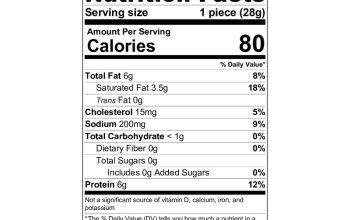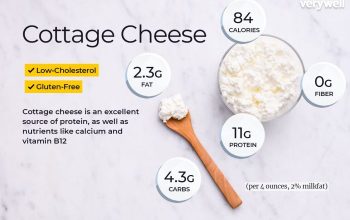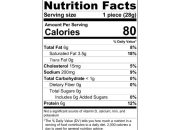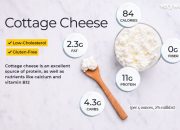Macronutrient Content and Ratios: Cheese Burger Nutrition Facts
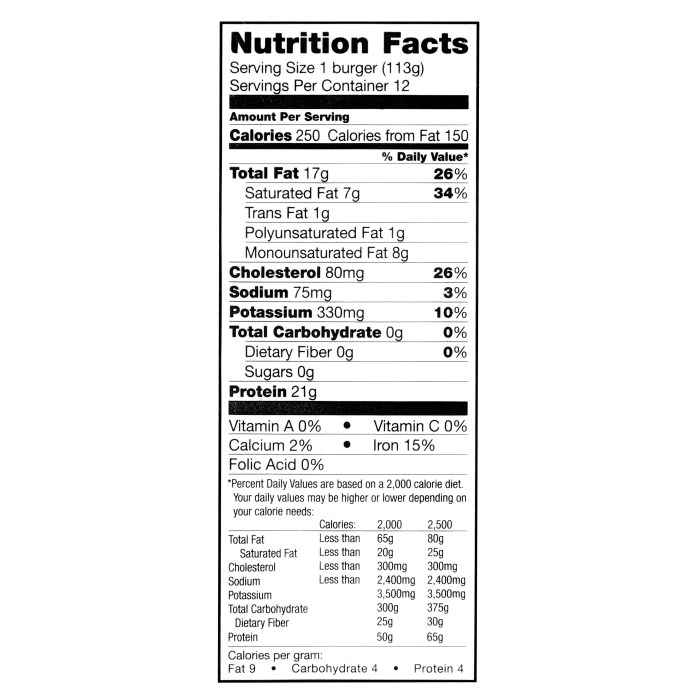
Cheese burger nutrition facts – A cheeseburger, that iconic culinary creation, presents a fascinating case study in macronutrient composition. Understanding the balance of fat, carbohydrates, and protein within a cheeseburger is crucial for making informed dietary choices, especially considering its frequent appearance in many diets. This section delves into the specific macronutrient breakdown of a typical cheeseburger and compares it to recommended daily intakes, also exploring how cheese variety influences this nutritional profile.A standard cheeseburger, consisting of a beef patty, cheese slice, bun, and typical condiments (lettuce, tomato, onion, pickles, ketchup, mustard), typically contains approximately 25-35 grams of fat, 30-40 grams of carbohydrates, and 20-30 grams of protein.
These values can fluctuate considerably depending on the size of the patty, type of bun, cheese selection, and amount of added condiments. It’s important to note that these are estimates, and the actual macronutrient content can vary significantly between different restaurants and home-prepared versions.
Macronutrient Ratios and Daily Intake Recommendations
The macronutrient ratio in a cheeseburger is heavily skewed towards fat and carbohydrates. Compared to recommended daily intakes, which vary based on individual factors like age, sex, activity level, and overall health goals, a single cheeseburger can easily contribute a significant portion of the daily fat intake, potentially exceeding recommended limits for some individuals. The carbohydrate content, primarily from the bun, also represents a considerable portion of daily carbohydrate intake.
Protein, while present, often represents a smaller percentage of the total macronutrient composition. For example, a 2000-calorie diet might recommend 45-65% carbohydrates, 20-35% fat, and 10-35% protein. A cheeseburger, however, might contribute a much higher percentage of fat and a lower percentage of protein compared to these guidelines. Careful consideration should be given to balancing the cheeseburger’s macronutrient contribution with the rest of the daily diet.
Impact of Cheese Type on Macronutrient Profile
The choice of cheese significantly influences the overall macronutrient profile of the cheeseburger. Cheddar cheese, for instance, tends to be higher in fat and protein compared to Swiss cheese, which is relatively lower in fat but still contains a good amount of protein. American cheese often falls somewhere in between, with moderate fat and protein content. This variation affects the overall fat and protein content of the cheeseburger, while the carbohydrate content remains largely unaffected by the cheese selection.
A cheeseburger with cheddar will have a higher fat content than one with Swiss cheese. Therefore, understanding the nutritional information of different cheeses is vital for making conscious choices about the overall nutritional composition of your cheeseburger.
Understanding a cheeseburger’s nutritional profile often involves considering its fat and sodium content. However, comparing this to the caloric density of other cheesy dishes provides a broader perspective. For instance, a quick look at the velveeta shells and cheese nutrition facts reveals a different balance of nutrients. Ultimately, both the cheeseburger and this cheesy pasta dish highlight the importance of mindful portion control for balanced nutrition.
Micronutrient Profile
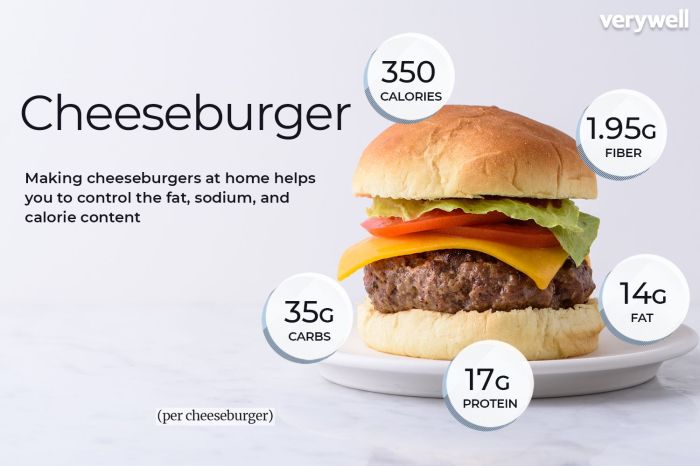
A cheeseburger, seemingly simple, offers a surprisingly complex array of micronutrients, albeit in varying amounts and bioavailability. The nutritional profile is heavily influenced by the specific ingredients used – the type of beef, cheese, and bun all play a role. Understanding this profile is key to assessing its contribution to a balanced diet and identifying potential nutritional imbalances from regular consumption.
The micronutrients found in a cheeseburger are largely derived from the beef patty, cheese, and to a lesser extent, the bun. These nutrients contribute to various bodily functions, from energy production and immune support to bone health and cellular processes. However, relying solely on cheeseburgers for micronutrient intake can lead to imbalances, highlighting the importance of a diverse diet.
Vitamins and Minerals in a Cheeseburger
A typical cheeseburger provides a modest amount of several essential vitamins and minerals. The quantities vary significantly depending on the size and ingredients of the burger. The following list provides a general overview, keeping in mind that these values are approximate and can fluctuate widely.
- Vitamin B12 (Cobalamin): Primarily from the beef, crucial for nerve function and red blood cell formation. A 150g beef patty might contain around 2-3 mcg.
- Riboflavin (Vitamin B2): Found in both the beef and cheese, involved in energy metabolism. Amounts vary, but a cheeseburger might contribute 0.2-0.5 mg.
- Niacin (Vitamin B3): Present in beef, essential for energy production and DNA repair. A cheeseburger may provide 2-4 mg.
- Iron: Significantly present in the beef, essential for oxygen transport in the blood. The amount depends on the type of beef and cooking method; a cheeseburger could provide 2-5 mg.
- Zinc: Found in both beef and cheese, important for immune function and wound healing. A cheeseburger might contain 1-3 mg.
- Selenium: Present in beef, an antioxidant that protects cells from damage. Amounts are variable, but a cheeseburger could offer 5-15 mcg.
- Calcium: Primarily from the cheese, vital for bone health and muscle function. The quantity depends heavily on the type and amount of cheese; a cheeseburger with cheddar cheese might provide 100-200 mg.
Potential Micronutrient Deficiencies and Excesses
Regular consumption of cheeseburgers as a primary food source can lead to certain micronutrient deficiencies. The high saturated fat content and lack of fiber, vitamins A and C, and many other essential nutrients can create imbalances. Conversely, excessive consumption can lead to an excess of sodium, saturated fat, and cholesterol.
For example, a diet consisting mainly of cheeseburgers would likely be deficient in Vitamin C, crucial for immune function and collagen synthesis. The lack of dietary fiber can also contribute to digestive problems. Conversely, the high sodium content can contribute to high blood pressure in susceptible individuals. The high saturated fat intake is a risk factor for heart disease.
Micronutrient Contribution of Ingredients, Cheese burger nutrition facts
The bun, patty, and cheese each contribute differently to the overall micronutrient profile. The beef patty is the primary source of iron, B vitamins, and zinc. Cheese provides a significant amount of calcium and some B vitamins. The bun, typically refined flour, contributes relatively little in terms of micronutrients, offering mainly carbohydrates.
For instance, a whole wheat bun might offer slightly more fiber and some B vitamins compared to a white bun, but the overall micronutrient contribution from the bun remains relatively minor compared to the patty and cheese. The type of cheese used also plays a significant role; a harder cheese like cheddar typically contains more calcium than a softer cheese like mozzarella.
Query Resolution
What are the long-term health risks associated with eating cheeseburgers regularly?
Regular consumption of cheeseburgers, particularly those high in saturated fat and sodium, can increase the risk of heart disease, type 2 diabetes, and obesity due to high calorie and fat content. It’s important to consume them in moderation as part of a balanced diet.
Are there any healthier cheese options for cheeseburgers?
Lower-fat cheese options like part-skim mozzarella or reduced-fat cheddar can significantly reduce the overall fat and calorie content of your cheeseburger compared to full-fat cheeses.
How can I make a cheeseburger healthier?
Choose lean ground beef, a whole-wheat bun, and load up on vegetables like lettuce, tomato, and onion. Consider smaller patties and using lower-fat cheese. Portion control is also crucial.
How many cheeseburgers can I eat per week and still maintain a healthy diet?
There’s no magic number. It depends on your overall dietary intake and activity level. Limiting consumption to once or twice a week, and focusing on healthier modifications, is generally recommended.

